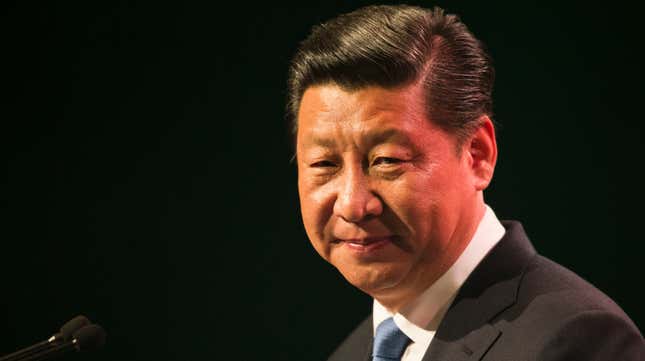
As a way to avoid making commitments to address climate change, U.S. leaders will often make the bad faith argument that their actions aren’t as important as those of the world’s top carbon emitter, China. Well, America, I hate to break it to you, but China just massively upped its climate commitments. Your move.
The Chinese government plans to bring national carbon emissions to a peak by 2030 and achieve carbon neutrality by 2060, President Xi Jinping announced at the virtually held United Nations General Assembly on Tuesday.
To do so, he said, the country will enhance its sustainability polices and strengthen its nationally determined contribution (NDC), or plans to meet the Paris Climate Accord’s goal of keeping global temperature rise “well below” a 2-degree Celsius (3.6-degree Fahrenheit) increase over pre-industrial levels. Earlier this year, executive secretary of the UN Framework Convention on Climate Change Patricia Espinosa said that most nations’ NDCs, including China’s, were far from strong enough to meet that target.
Jinping’s announcement was hotly anticipated. It followed a promise made by the country’s top climate advisor that China would “do more” to reduce greenhouse gas pollution. The country was responsible for some 11.4 billion tons of carbon dioxide pollution last year and is currently the top greenhouse gas emitter in the world. The U.S., though is the biggest historical emitter.
In his announcement, President Jinping also called for other countries to up their climate plans, stressing the need for international action on not just climate change, but also the covid-19 pandemic.
“Covid-19 reminds us that humankind should launch a green revolution and move faster to create a green way of development and life, preserve the environment and make Mother Earth a better place for all,” he said. “Humankind can no longer afford to ignore the repeated warnings of nature and go down the beaten path of extracting resources without investing in conservation, pursuing development at the expense of protection, and exploiting resources without restoration.”
Indeed, though coronavirus lockdowns have temporarily lowered greenhouse emissions, they’ve proved a wholly insufficient replacement for climate action. Genuine environmental policy could also help protect the Earth from exposure to further pandemics.
This is all big news, but it should be noted that countries’ NDCs are not legally binding. China could still blow off these commitments, especially when they get in the way of coal expansion. The country is the world’s biggest coal market, responsible for burning half of the dirty fuel used globally each year. This year, the country infuriated the international environmental movement by approving plans to increase coal plant capacity. The nation also finances fossil fuel projects abroad, including in the U.S., a practice which the Paris Agreement doesn’t regulate.
President Jinping’s talk of using the pandemic as a springboard to a carbon-free future also rings a little hollow. China’s emissions spiked above pre-coronavirus lockdown levels in May and results suggest that was largely due to a surge in coal use. A paltry 1.9% of funds for China’s coronavirus stimulus have been earmarked for clean energy and other green investments.
So ultimately, this pledge is a big deal, but we still need to push for stronger international climate policy and to make it binding. That way, we can ensure that leaders everywhere not only make plans that meet the scale and urgency of the climate crisis, but also stick to them.